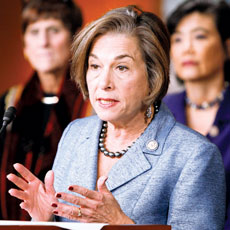
Long-term care providers could have good reason to worry that forthcoming Medicare reforms could cut into their reimbursements, following a two-day hearing on Capitol Hill. Lawmakers reiterated pledges to permanently change the way physician payment rates are calculated. They also emphasized that provider reimbursement cuts and beneficiary cost-sharing might very well be needed due to the price-tag on the policy shift.
A bipartisan, bicameral bill introduced last year offers a viable framework for permanently replacing the Sustainable Growth Rate, members of the House Energy and Commerce Health Subcommittee stressed at the hearing. The obstacle in getting the bill passed is disagreement over how to pay for the change. The hearing on Wednesday and Thursday did not appear to make much progress, observers say.
Witnesses reviewed potential pay-for provisions, but these generally were already familiar to lawmakers. For example, on the hearing’s first day, former Vermont Senator and Democratic vice-presidential candidate Joe Lieberman went over a Medicare reform plan that he had largely developed during his time in Congress. Testimony on the second day also offered “no new ideas on how to pay,” summarized Bloomberg BNA reporter Nathaniel Weixel.
Rep. Jan Schakowsky (D-IL) made an impassioned case for moving forward, even if payment mechanisms still are up in the air. Affordable Care Act policies already are slowing down Medicare spending, and this slowdown ultimately could offset the cost of getting rid of the SGR, she stated. The House of Representatives recently passed a bill changing the ACA’s definition of full-time work from 30 hours to 40 hours, and GOP lawmakers did not explain how this $53 billion measure would be paid for, she noted.
However, Health Subcommittee Chairman Joe Pitts (R-PA) said offsets must be in place before the bill would be taken up on the House floor.
With the prospect of long-term care payment cuts on the table, the American Health Care Association/National Center for Assisted Living recently launched a lobbying campaign. The organization has said it will issue its own policy recommendations for SGR reform, which would offer savings without cutting provider pay indiscriminately.



